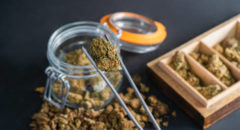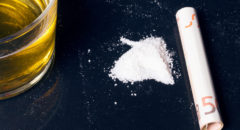 The Food and Drug Administration (FDA) approved the first mobile medical app to help people suffering substance use disorders (SUDs) from alcohol, marijuana, or cocaine addiction.
The Food and Drug Administration (FDA) approved the first mobile medical app to help people suffering substance use disorders (SUDs) from alcohol, marijuana, or cocaine addiction.
According to the Substance Abuse and Mental Health Services Administration (SAMHSA), abuse of said substances is costly to our nation, “exacting more than $740 billion annually in costs related to crime, lost work productivity and health care.
Per the FDA's September 14 press release, ”According to the Substance Abuse and Mental Health Services Administration, SUD occurs when an individual’s recurrent use of alcohol and/or drugs causes clinically and functionally significant impairment, such as health problems, disability, and failure to meet major responsibilities at work, school or home. According to the Diagnostic and Statistical Manual of Mental Disorders, Fifth Edition, a diagnosis of substance use disorder is based on evidence of impaired control, social impairment, risky use and pharmacological criteria."
In 2014, the rate of illegal drug use among African Americans ages 12 and up was 12.4 percent. Meanwhile, the national average was 10.2 percent. Binge drinking among Blacks was even higer, coming in at 21.6 percent. It’s important to note that underage binge drinking was 8.5 percent for Black youth, while the national average was 13.8 percent.
“The reset device is designed by Pear Therapeutics and now cleared to assist in outpatient therapy for alcohol, cocaine, marijuana, and stimulant addiction—although it is notably not permitted for treating opioid dependence,” Fortune reports.
So how does the app assist in addiction therapy? The device “delivers cognitive behavioral therapy to patients to teach the user skills that aid in the treatment of SUD and are intended to increase abstinence from substance abuse and increase retention in outpatient therapy programs. The system is intended to be used in conjunction with outpatient therapy and in addition to a contingency management system, a widely-used program for treating SUD that uses a series of incentives to reward patients for adherence to their treatment program,” the press statement reads.
While it’s still too early to tell, the impact appears to be promising. More than 40 percent of patients who used the Reset system in addition to standard therapy refrained from alcohol, cocaine, marijuana, and stimulant substance abuse over a three-month period. This is compared with 17.6 percent abstinence for those receiving standard therapy alone, according to the FDA.
“This is an example of how innovative digital technologies can help provide patients access to additional tools during their treatment,” said Carlos Peña, Ph.D., M.S., director of the Division of Neurological and Physical Medicine Devices in FDA’s Center for Devices and Radiological Health in a statement. “More therapy tools means a greater potential to help improve outcomes, including abstinence, for patients with substance use disorder.”
It's important to note, that the device is prescription only and for people “not currently on opioid replacement therapy, who do not abuse alcohol solely, or whose primary substance of abuse is not opioids.”
Minorities tend to experience greater burden of mental and substance use disorders (SUD) often due to poorer access to care; insufficient care; and higher social, environmental, and economic risk factors. The new technology could prove beneficial to bridging disparities in treatment and outcomes.









